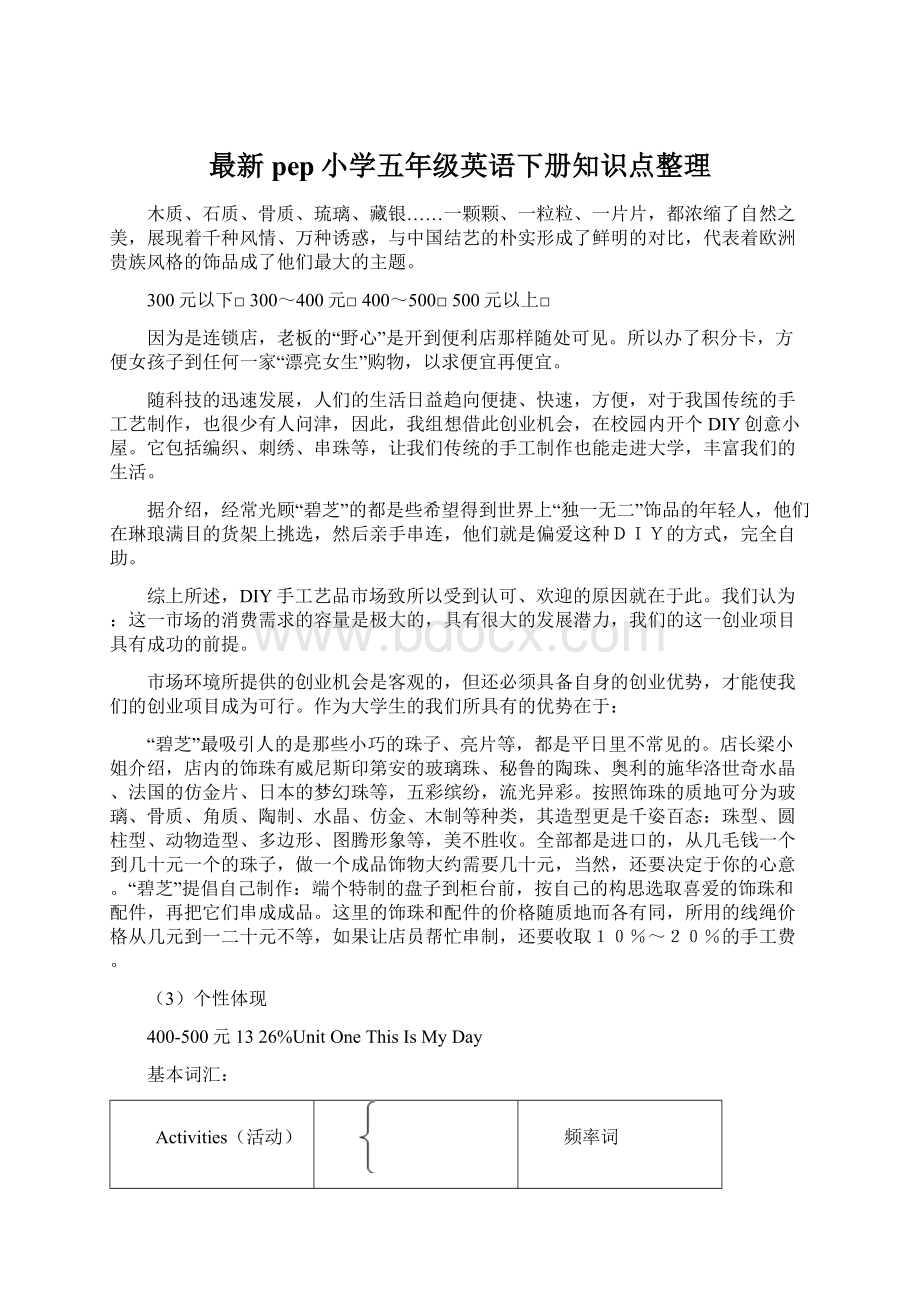 最新pep小学五年级英语下册知识点整理.docx
最新pep小学五年级英语下册知识点整理.docx
- 文档编号:6731632
- 上传时间:2023-01-09
- 格式:DOCX
- 页数:16
- 大小:34.08KB
最新pep小学五年级英语下册知识点整理.docx
《最新pep小学五年级英语下册知识点整理.docx》由会员分享,可在线阅读,更多相关《最新pep小学五年级英语下册知识点整理.docx(16页珍藏版)》请在冰豆网上搜索。

最新pep小学五年级英语下册知识点整理
木质、石质、骨质、琉璃、藏银……一颗颗、一粒粒、一片片,都浓缩了自然之美,展现着千种风情、万种诱惑,与中国结艺的朴实形成了鲜明的对比,代表着欧洲贵族风格的饰品成了他们最大的主题。
300元以下□300~400元□400~500□500元以上□
因为是连锁店,老板的“野心”是开到便利店那样随处可见。
所以办了积分卡,方便女孩子到任何一家“漂亮女生”购物,以求便宜再便宜。
随科技的迅速发展,人们的生活日益趋向便捷、快速,方便,对于我国传统的手工艺制作,也很少有人问津,因此,我组想借此创业机会,在校园内开个DIY创意小屋。
它包括编织、刺绣、串珠等,让我们传统的手工制作也能走进大学,丰富我们的生活。
据介绍,经常光顾“碧芝”的都是些希望得到世界上“独一无二”饰品的年轻人,他们在琳琅满目的货架上挑选,然后亲手串连,他们就是偏爱这种DIY的方式,完全自助。
综上所述,DIY手工艺品市场致所以受到认可、欢迎的原因就在于此。
我们认为:
这一市场的消费需求的容量是极大的,具有很大的发展潜力,我们的这一创业项目具有成功的前提。
市场环境所提供的创业机会是客观的,但还必须具备自身的创业优势,才能使我们的创业项目成为可行。
作为大学生的我们所具有的优势在于:
“碧芝”最吸引人的是那些小巧的珠子、亮片等,都是平日里不常见的。
店长梁小姐介绍,店内的饰珠有威尼斯印第安的玻璃珠、秘鲁的陶珠、奥利的施华洛世奇水晶、法国的仿金片、日本的梦幻珠等,五彩缤纷,流光异彩。
按照饰珠的质地可分为玻璃、骨质、角质、陶制、水晶、仿金、木制等种类,其造型更是千姿百态:
珠型、圆柱型、动物造型、多边形、图腾形象等,美不胜收。
全部都是进口的,从几毛钱一个到几十元一个的珠子,做一个成品饰物大约需要几十元,当然,还要决定于你的心意。
“碧芝”提倡自己制作:
端个特制的盘子到柜台前,按自己的构思选取喜爱的饰珠和配件,再把它们串成成品。
这里的饰珠和配件的价格随质地而各有同,所用的线绳价格从几元到一二十元不等,如果让店员帮忙串制,还要收取10%~20%的手工费。
(3)个性体现
400-500元1326%UnitOneThisIsMyDay
基本词汇:
Activities(活动)
Time(时间)
频率词
getup起床
domorningexercises晨练
haveEnglishclass上英语课
playsports进行体育活动
playthepiano弹钢琴
climbmountains爬山
goshopping购物
gohiking去远足
visitgrandparents看望外/祖父母
eatbreakfast吃早饭
eatdinner吃晚饭
morning早上
intheafternoon下午
evening晚上
noon中午
atnight夜晚
6:
00具体时间
onSunday在星期天
when什么时候
always总是
usually通常
often经常
sometimes有时
seldom很少
never从不
(频率程度依次减低)
基本句型:
1.询问生活规律:
----Whendoyou……?
你什么时候……?
----Iusually…at…SometimesI….我通常在…(点钟)…(做什么事)。
有时…
E.g.---Whendoyougotoschool?
你每天几点去上学?
---Iusuallygotoschoolat7:
00.SometimesIgotoschoolat7:
10.
2.询问生活习惯:
---Whatdoyoudoontheweekend?
你周末做什么?
---Iusually/often…..SometimesI…..
E.g.---Whatdoyoudoontheweek?
---Ioftenplayfootball.SometimesIgoshoppingwithmymom.
3.介绍自己的生活习惯:
EveryweekendIgohiking.我每个周末远足。
EverydayIdomyhomeworkat8:
00intheevening.我每天晚上8点做作业。
4.询问职业:
---Whatdoyoudo?
你是干什么的?
---Iamadoctor/nurse/policeman….
5.Thankyoufortellingmeaboutyourday!
谢谢你告诉我你的一天。
6.Let’s….让我们….(let’s=letus)
Let’sgohikingtogethernextSunday.下周我们一起去远足吧。
句型转换:
1.肯定句↔一般疑问句:
Iusuallygetupat6:
00.↔Doyouusuallygetupat6:
00?
肯定回答:
Yes,Ido.否定回答:
No,Idon’t.
(第三人称时)Heeatsdinnerat6:
00p.m.↔Doesheeatdinnerat6:
00p.m.?
2.肯定句↔否定句:
Ilikeplayingthepiano.↔Idon’tlikeplayingthepiano.
Icanplaythepiano.↔Ican’tplaythepiano.
3.划线提问:
⑴Ioftengoshoppingontheweekend.→Whendoyougoshopping?
⑵Ioftengoshoppingontheweekend.→Whatdoyoudoontheweekend?
⑶Iamastudent.→Whatdoyoudo?
⑷Igotoschoolat7:
00.→Whendoyougotoschool?
知识延伸:
⑴同义词:
playsports=dosports
eatbreakfast/lunch/dinner=havebreakfast/lunch/dinner
⑵同义句:
Whatdoyoudo?
=Whatareyou?
你是干什么的?
⑶一般将来时:
(begoingto)
Theweatherreportsaysitisgoingtoraintomorrow.天气预报说明天将要下雨。
作文:
Myday
Hello,mynameisSarah.Iamaprimaryschoolstudent.Iusuallygetupat6:
30a.m.ThenIeatbreakfastandgotoschoolat7:
00a.m.EverydayIhavelunchat12:
00noon.At5:
10p.m,Igohome,andthenIdomyhomework.IeatdinnerwithmyparentsandwatchTV.Igotobedat9:
00p.m.Thisismyday.Whataboutyou?
MynameisAnna.Todayissunny.Igetupat6:
00.ThenIeatbreakfastandgotoschool.
Ihavefoursubjects.OneChineseclass,onemathclass,oneEnglishclassandoneP.E.class.
Atnoonwehavelunchatschool.Afternoon,wehavetwomathlessonsandonemusiclesson.
Mathistoodifficult.ThenIgohomeanddomyhomework,nextIhavedinnerwithmyparentsandwatchTV.Igotobedatnineo’clock.
UnitTwoMyFavouriteSeason
基本词汇:
Season
(季节)
MonthFestival
(月份)(节日)
Weather
(天气)
Activity
(活动)
spring
MarchTree-plantingDayWomen’sday
AprilAprilFool’sDay
MayLaborDayMother’sDay
windy
and
warm
planttrees
summer
JuneChildren’sDayDragonboatFestival
Father’sDay
JulyPartybuildingDay
AugustArmyDay
sunny
and
hot
swim
fall
(autumn)
SeptemberTeachers’Day
Mid-autumnFestival
OctoberNationalDayHalloween
NovemberThanksgivingDayHalloween
windy
and
cool
flykites
winter
DecemberChristmasDay
JanuaryNewYear’sDay
FebruarySpringFestival
windy
and
cold
skate
makeasnowman
基本句型:
1.询问喜欢哪个季节:
⑴---Whichseasondoyoulikebest?
你最喜欢哪个季节?
---Ilike+季节+best.(例:
Ilikespring∕summer∕fall∕winterbest)
---或:
Ilikesummer,becauseIcanswiminthesea.
⑵---Whatisyourfavouriteseason?
你最喜爱的季节是什么?
---Spring∕summer∕fall∕winterismyfavouriteseason.
2.询问天气:
---WhatistheweatherlikeinfallinBeijing?
北京秋天的天气是怎么样的?
---Itissunnyandcool.
3.询问理由:
---Whydoyoulikewinterbest?
为什么你最喜欢冬天?
---BecauseIcanplaywithsnowandmakeasnowman.
4.询问想要做什么
---Whatwouldyouliketodo?
---I’dliketoclimb∕playsports……(I’d=Iwould)
5.询问具体季节
---WhatseasonisitinMarchinBeijing?
北京的三月份是什么季节?
---Itisspring.
6.询问能做什么
---WhatcanIdothere?
我在那里能做什么?
---YoucangototheGreatWall.你可以去长城。
7.询问接下来打算去哪里?
(begoingto一般将来时)
---Whereareyougoingonvacation?
假期你打算去哪里?
---IamgoingtoCanada.我将要去加拿大。
8.SummerisfromJunetoAugust.六月至八月是夏天。
9.HowdoIlook?
我看起来怎么样?
10.Sendmeapostcard.寄明信片给我。
11.HowdidTHAThappen?
那是怎么发生的!
12.WhenisthebesttimetogotoBeijing?
Fall.什么时候最适合去北京?
秋天。
知识延伸:
1.特殊疑问句:
⑴which引导的特殊疑问句,询问喜欢哪个季节:
Whichseasondoyoulikebest?
⑵why引导的特殊疑问句,询问喜欢某个季节的原因:
Whydoyoulikesummer?
⑶when引导的特殊疑问句,询问什么时候:
WhenisthebesttimetogotoBeijing?
2.第三人称单数形式:
say—says(说)ask—asks(问)come—comes(来)
3.单复数:
tree—trees(树)leaf—leaves(叶子)
4.同义词:
fall—autumn秋天
5.同义句:
Whichseasondoyoulikebest?
-----What’syourfavouriteseason?
6.snowy下雪的cloudy多云的rainy下雨的
7.相似短语:
playwithsnow玩雪liketoswim游泳(like+todo)
playinthesnow在雪地玩likeswimming游泳(like+doing)
句型转换:
1.肯定句↔一般疑问句:
⑴Ilikesummer.↔Doyoulikesummer?
肯定回答:
Yes,Ido.否定回答:
No,Idon’t.
⑵Itissunnyandhot.↔Isitsunnyandhot?
肯定回答:
Yes,itis.否定回答:
No,itisn’t.
⑶Theskyisveryblue.↔Istheskyveryblue?
Theleavesarecolourful.→Aretheleavescolourful?
2.划线提问:
⑴Ilikesummerbest.→Whichseasondoyoulikebest?
⑵Myfavouriteseasoniswinter.→Whatisyourfavouriteseason?
⑶ItissunnyinMayinBeijing.→WhatistheweatherlikeinMayinBeijing?
⑷I’dliketoswim.→Whatwouldyouliketodo?
作文:
Myfavouriteseason
㈠春天篇Hello,mynameisxxx.Therearefourseasonsinayear,andIlikespringbest.Itiswindyandwarm.IthasaTree-plantingDay,andIcanplanttreeswithmyparents.Icanwearmynewsweater.Ilovespring.
㈡夏天篇Hello,mynameisxxx.Myfavouriteseasonissummer.Why?
Becausesummerissunnyandhot.Icanswimintheswimmingpool.Icaneaticecreamanddrinksomejuice.AndIcanwearmyT-shirtandshorts.Ilikesummer.Whataboutyou?
㈢秋天篇Hello,mynameisxxx.Fallismyfavouriteseasoninayear.Becauseitiswindyandcool.Icanflykites.Icangohikingorhaveapicnicwithmyfriends.AndIliketoeatmooncakeswhenMid-autumnFestivalcomes.Ilovefallverymuch.Andyou?
㈣冬天篇Hello,mynameisxxx.Myfavouriteseasoniswinter.Itisalwayswindyandcold.Icanplayinthesnowwithmyclassmates.IcanmakeasnowmanandIcanskate.Ilovewinter!
Howaboutyou?
全写与缩写:
Iam=I’m
youare=you’re
whois=who’s
donot=don’t
cannot=can’t
Iwould=I’d
letus=let’s
doesnot=doesn’t
动词原形→第三人称单数形式:
普通形式
直接在动词后+s:
如like→likes、ask→asks、play→plays、come→comes
特殊形式
have→has
do→does
watch→watches
Unit3Mybirthday
基本词汇:
month(月份)
winter
spring
summer
fall(autumn)
December(Dec.)
March(Mar.)
June(Jun.)
September(Sept.)
January(Jan.)
April(Apr.)
July(Jul.)
October(Oct.)
February(Feb.)
May
August(Aug.)
November(Nov.)
ps月份的另一种缩写形式为:
仅仅大写前三个字母,如:
JAN一月、FEB二月
numbers(数字)
基数词
one
two
three
four
five
序数词
first(1st)
second(2nd)
third(3rd)
fourth(4th)
fifth(5th)
基数词
eight
nine
twelve
twenty
序数词
eighth(8th)
ninth(9th)
twelfth(12th)
twentieth(20th)
基本句型:
1.询问生日的时间:
⑴----Whenisyour/his/herbirthday?
你的/他的/她的生日在什么时候?
----My/his/herbirthdayisinJune.在六月。
⑵----Isyour/his/herbirthdayinJuly?
你的/他的/她的生日在七月吗?
----Yes,itis./No,itisn’t.
2.询问日期:
----Whatisthedatetoday?
/Whatdateisittoday?
今天几号?
----ItisJune1st.今天六月一号。
区分:
(问星期)----Whatdayisittoday?
今天星期几?
----ItisSunday.今天星期天。
3.问节日:
----WhenistheTeachers’Day?
教师节是什么时候?
----ItisSeptember10th.
4.询问一个月里有多少人生日:
----HowmanybirthdaysarethereinJanuary?
一月有多少人生日?
----Thereare….
5.询问谁的生日在某月:
----WhohasabirthdayinOctober?
谁的生日在十月?
(同义句:
WhosebirthdayisinOct.?
)
----Me.我。
6.----Whatareyoudoing,John?
约翰,你在做什么?
----Iammakingabirthdaychartforourfamily.我正在做我们家的生日表。
7.----Doesshehaveacomputer?
她有电脑吗?
----No,shedoesn’t.不,她没有。
8.----Thenshewon’tbeabletoseethecard.那她不可能看见这卡片。
(won’t=willnot)
句型转换:
⒈肯定句→一般疑问句:
①把be动词(am/is/are)调到句首:
第一、二人称:
MybirthdayisinJune.↔IsyourbirthdayinJune?
第三人称:
John’sbirthdayisMay1st.↔IsJohn’sbirthdayMay1st?
(这里主要讲的是生日,因此回答一律用it来回答:
Yes,itis./No,itisn’t.)
②以助动词do的适当形式引导:
第一、二人称:
Ihaveacomputer.↔Doyouhaveacomputer?
(Yes,Ido./No,Idon’t.)
第三人称:
Shehasacomputer.↔Doesshehaveacomputer?
(Yes,shedoes./No,shedoesn’t.)
(当句子出现does的时候,句中的动词要使用动词的原形。
)
⒉肯定句↔否定句:
在be动词(am/is/are)后+not:
HisbirthdayisinJan.↔Hisbirthdayisn’tinJan.(isnot=isn’t)
⒊划线提问:
⑴MybirthdayisinFeb..→Whenisyourbirthday?
⑵Amy’sbirthdayisApr.9th.→WhosebirthdayisApr.9th?
⑶Jo
- 配套讲稿:
如PPT文件的首页显示word图标,表示该PPT已包含配套word讲稿。双击word图标可打开word文档。
- 特殊限制:
部分文档作品中含有的国旗、国徽等图片,仅作为作品整体效果示例展示,禁止商用。设计者仅对作品中独创性部分享有著作权。
- 关 键 词:
- 最新 pep 小学 年级 英语 下册 知识点 整理
 冰豆网所有资源均是用户自行上传分享,仅供网友学习交流,未经上传用户书面授权,请勿作他用。
冰豆网所有资源均是用户自行上传分享,仅供网友学习交流,未经上传用户书面授权,请勿作他用。


 铝散热器项目年度预算报告.docx
铝散热器项目年度预算报告.docx
